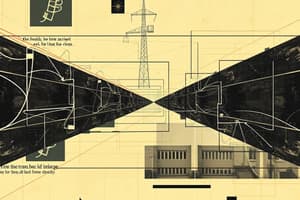Podcast
Questions and Answers
Which of the following is NOT a key component of data communication?
Which of the following is NOT a key component of data communication?
- Receiver
- Protocol
- Message
- Transmitter (correct)
What best defines a Computer Network?
What best defines a Computer Network?
- Two or more connected computers that share resources. (correct)
- A set of protocols used for secure communication.
- A device that connects multiple computers to the internet.
- A system of software that manages data transfers.
What role does a protocol play in data communication?
What role does a protocol play in data communication?
- It represents the physical medium for data transmission.
- It determines the type of message being sent.
- It governs the rules of communication. (correct)
- It transmits data between the sender and the receiver.
Which transmission medium is NOT typically used in data communication?
Which transmission medium is NOT typically used in data communication?
In data communication, which component is responsible for initiating the data transfer?
In data communication, which component is responsible for initiating the data transfer?
What is the primary use of a Personal Area Network (PAN)?
What is the primary use of a Personal Area Network (PAN)?
Which of the following describes the range of a Local Area Network (LAN)?
Which of the following describes the range of a Local Area Network (LAN)?
What is a characteristic of a Campus Area Network (CAN)?
What is a characteristic of a Campus Area Network (CAN)?
Which example best fits a Metropolitan Area Network (MAN)?
Which example best fits a Metropolitan Area Network (MAN)?
What is the main function of a Local Area Network (LAN)?
What is the main function of a Local Area Network (LAN)?
Flashcards are hidden until you start studying
Study Notes
Network Fundamentals
- Data Communication: Exchange of data between devices utilizing a transmission medium, involving a sender, receiver, and various channels like cables or wireless signals.
- Key Components:
- Sender: Originates the data.
- Receiver: Device that receives the data.
- Transmission Medium: The physical path data travels through.
- Message: The information being transmitted.
- Protocol: Rules governing communication.
Definition of a Network
- Computer Network: Connection of two or more computers that share resources like data, printers, applications, or internet connections.
Classification of Network Types
-
Personal Area Network (PAN):
- Range: Very short, typically within a few meters.
- Use: Connecting personal devices (e.g., smartphones, tablets).
- Examples: Bluetooth and USB connections.
-
Local Area Network (LAN):
- Range: Limited to a small geographic area, such as a building or campus.
- Use: Connecting devices to share resources.
- Examples: Office and home networks.
-
Campus Area Network (CAN):
- Range: Larger than a LAN but a specific geographic area like a university campus.
- Use: Connecting multiple LANs.
- Examples: University or corporate campuses.
-
Metropolitan Area Network (MAN):
- Range: Spans a city or large campus.
- Use: Connecting multiple LANs across a metropolitan area.
- Examples: City-wide Wi-Fi and cable TV networks.
Topologies Classification
- Physical Topology: Refers to the arrangement of network devices and cables.
- Logical Topology: Describes how software controls access to network resources.
Types of Topologies
-
BUS Topology:
- Description: Single central cable connects all devices.
- Advantages: Easy installation, less cabling.
- Disadvantages: Hard to troubleshoot, limited length, and stations.
-
Star Topology:
- Description: All devices connect to a central hub or switch.
- Advantages: Simple management, individual device failure doesn’t affect others.
- Disadvantages: Central hub failure disrupts the entire network.
-
Ring Topology:
- Description: Each device connects to two others in a circular path.
- Advantages: Fast data transmission, no collisions.
- Disadvantages: Single device failure disrupts the network.
-
Mesh Topology:
- Description: Every device connects to every other device.
- Advantages: Highly reliable and secure.
- Disadvantages: Expensive and complex.
-
Tree Topology:
- Description: Combination of star and bus topologies.
- Advantages: Scalable, easy management.
- Disadvantages: Backbone failure affects the whole network.
-
Hybrid Topology:
- Description: Combines multiple topology types.
- Advantages: Flexible and scalable.
- Disadvantages: Complex design and implementation.
Physical Media Types
-
Common Types:
- Twisted-Pair Cables: Used with RJ-45 connectors; color-coded insulation.
- Coaxial Cables: Features a braided copper shield and BNC connectors.
- Fiber Optic Cables: Composed of glass and fiber cladding, reinforced with Kevlar.
-
Wireless Media: Involves wireless connections, such as Wi-Fi, to connect devices.
Physical Media Comparison
- Evaluation of different types of physical media used in networking, considering factors like speed, reliability, and installation complexity.
Studying That Suits You
Use AI to generate personalized quizzes and flashcards to suit your learning preferences.




